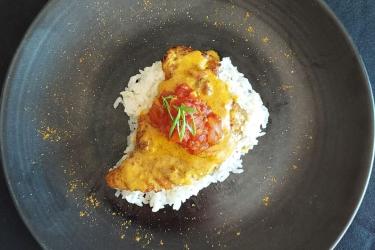Dr. Nicole Naar is an Aquaculture Specialist at Washington Sea Grant. She earned her doctoral degree in anthropology from the University of California-Davis, where she conducted fieldwork in Mexico and Tanzania. Currently her work focuses on conducting outreach for sustainable aquaculture and helping coastal communities respond to social and environmental challenges.
Blending Marine and Social Sciences
Growing up in Florida, Naar always had an interest in marine biology. In high school, she also developed an interest in social science. At the time, it seemed difficult to find a link between the two career paths. Luckily, on a student trip to Mexico, her eyes were opened to the possibility of combining anthropology, sustainability, and marine biology in a coastal setting.
One of Naar’s visits to Mexico focused on a small coastal town where many job seekers came from other areas of the country to work and fish. Fisheries were rumored to be overexploited due to the growing number of immigrant workers. To address these concerns and perceptions, Naar began to gather data on resource use, regulation compliance, and other factors. Ultimately, her work demonstrated that in terms of fishing practices, there was no difference between locals and non-locals.
"Fisheries are directly connected to the social science issues many people care about, such as job creation, local food systems, and environmental sustainability,” said Naar. “Social science research provides data that empowers communities to make informed decisions about sustainable wild-capture and aquaculture.”
Reaching Future Aquaculture Farmers
At Washington Sea Grant, Naar’s emphasis on using her research and social science expertise is increasing sustainable aquaculture literacy. Through this work she focuses on the importance of values and personal experiences when connecting with the aquaculture community—from producer to consumer. She focuses on details like aquaculture as a form of farming. This allows her to find the best ways to maximize outreach, shape effective messaging, and create broad access to sustainable seafood facts.
Naar also likes to highlight the diversity of aquaculture as a livelihood in Washington State. Shellfish harvest and farming is tradition in the Pacific Northwest. Tribes have harvested shellfish for generations, feeding their communities from Puget Sound and coastal shores. Washington’s seafood farms as we know them today date back to the mid-1800s, three decades before the state even entered the Union. In more recent years industry members from Asia and Latin America have joined Washington’s aquaculture community. Sharing the stories of these groups highlights the diverse nature of the aquaculture community and its opportunities.
Solving Research Challenges
The uniqueness of this work presents some challenges. For instance, social science projects haven't always aligned with what others consider to be top research priorities in aquaculture. However, the importance of social science has received more acknowledgement recently. “The limits to aquaculture expansion are increasingly social rather than technical, which means we need to better understand people—their perceptions of risk, their sense of place, and their values,” states Naar.
One way that Naar suggests to incorporate social science into aquaculture research and management would be to document local ecological knowledge of shellfish farmers. People—and families—who have worked in aquaculture for many years have a lot of in-depth knowledge of their waterways. This kind of knowledge can be hard to publish in the scientific literature, but could be cited and shared more widely if it were documented in social science literature.
According to Naar, there is no one “magic bullet” to increase social science or diversity and accessibility of aquaculture, but individual stories tend to resonate best. There are many exciting stories to tell from various perspectives across the United States, including:
- Founder of Minorities in Aquaculture
- History of black Chesapeake watermen
- Chef Xinh Dwelley
- Swinomish Clam Garden project
Watch: Swinomish Community Visits a Clam Garden
Increasing Access to Aquaculture
The importance of diversity and accessibility in aquaculture can be seen from several perspectives: the production side, education side, and consumer side. For instance, when the COVID-19 virus disrupted production across industries, buyers and sellers became more aware of local marketing activities (e.g., seafood and farmer’s markets, direct sales). Continuing to develop these channels can help get healthy seafood products onto more plates and allow consumers to support local food production.
As the demand for more local and more sustainable food production options increases, so does the need for careers to support the industry. Aquaculture and supporting marine careers paths could be fostered through smaller regional colleges, community colleges, and technical schools. This inclusion can improve diversity by creating new avenues of accessibility for students in rural areas or those looking for an alternative to a 4-year university as an entering point into the aquaculture industry.
As aquaculture continues to grow, social science work like that led by Naar will be vital to ensuring a sustainable and inclusive workforce. Naar hopes that the positive communication trends which developed out of necessity during COVID-19 will continue. When coastal communities connect with each other, they can combine resources and unify their response to social and environmental challenges now and for future generations.


